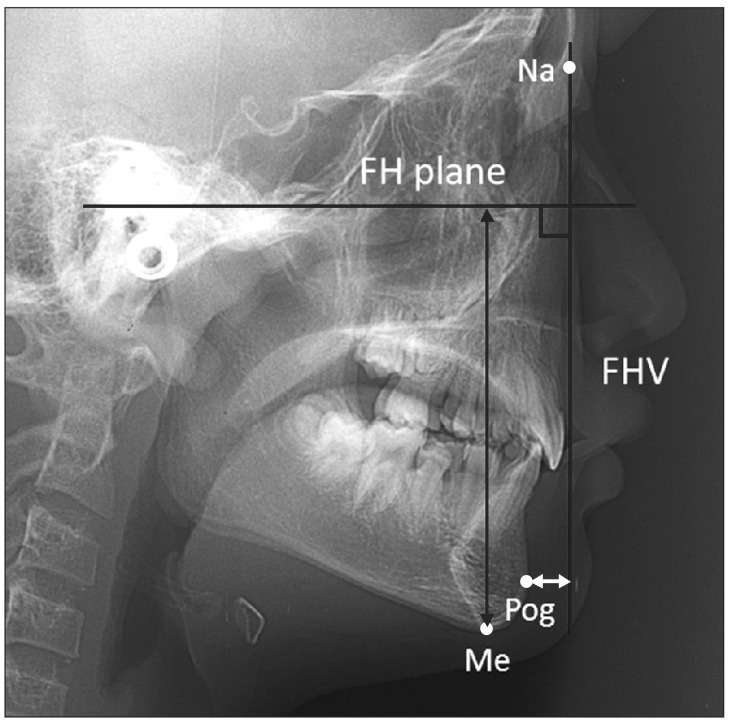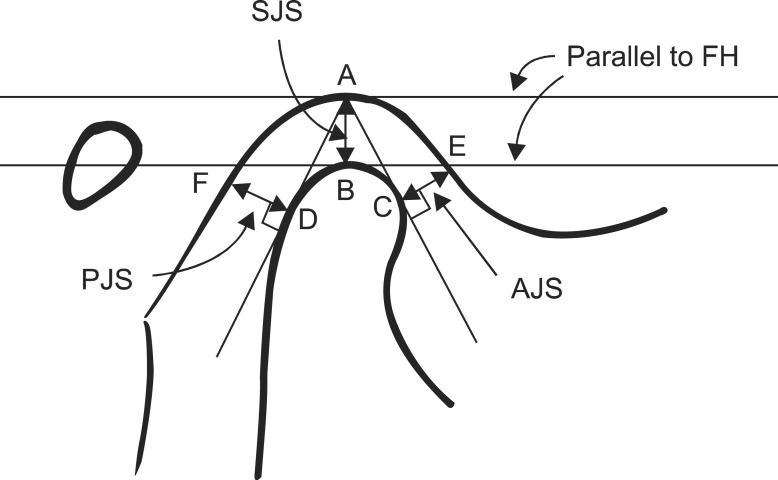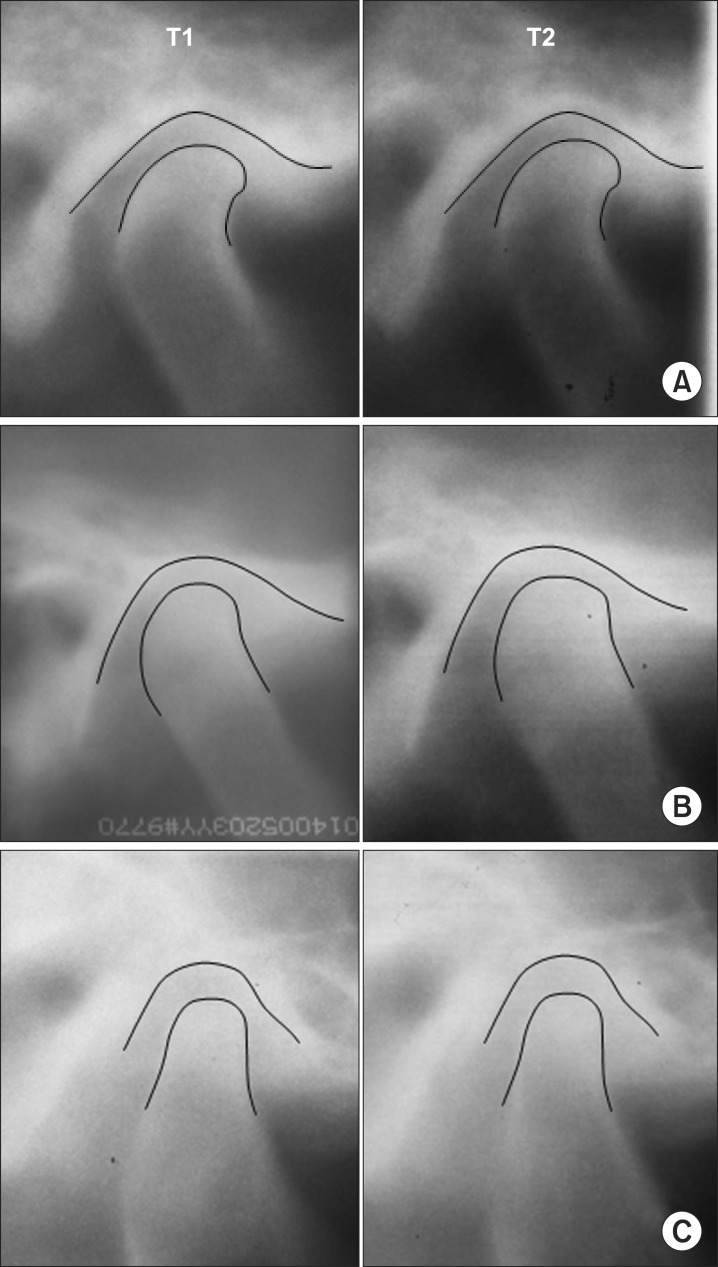J Korean Assoc Oral Maxillofac Surg.
2014 Aug;40(4):160-168. 10.5125/jkaoms.2014.40.4.160.
Positional change of the condyle after orthodontic-orthognathic surgical treatment: is there a relationship to skeletal relapse?
- Affiliations
-
- 1Department of Orthodontics, College of Dentistry, Gangneung-Wonju National University, Gangneung, Korea. dschoi@gwnu.ac.kr
- 2Research Institute for Dental Engineering, Gangneung-Wonju National University, Gangneung, Korea.
- 3Department of Oral and Maxillofacial Surgery, College of Dentistry, Gangneung-Wonju National University, Gangneung, Korea.
- KMID: 2005440
- DOI: http://doi.org/10.5125/jkaoms.2014.40.4.160
Abstract
OBJECTIVES
The purpose of this study was to evaluate the condylar position in relation to the glenoid fossa before and after orthodontic-orthognathic surgical treatment and to investigate the relationship with skeletal relapse.
MATERIALS AND METHODS
Lateral cephalograms and temporomandibular joint tomograms from 19 patients with mandibular prognathism who received orthodontic-orthognathic surgery were included in this study. Samples were divided into two groups based on skeletal change during the retention period. The relapse group consisted of 7 patients (3 females and 4 males; mean age, 21.9 years) whose pogonion or menton displaced more than 1 mm during the retention period and the stable group consisted of 12 patients (5 females and 7 males; mean age, 21.7 years). Anterior joint space, posterior joint space, superior joint space, and anteroposterior index were measured on tomograms at pretreatment and posttreatment timepoints. Condyle position and frequency of the positional change were compared between both groups.
RESULTS
In the relapse group and stable group, 42.9% and 45.8% of the condyles, respectively, showed forward or backward displacement at posttreatment. However, the changes were small and the mean anterior, posterior, superior joint spaces and frequencies of the positional changes did not differ statistically between both groups.
CONCLUSION
Our results suggest that small positional changes of the condyle, which may occur after orthodontic-orthognathic surgery treatment, may not be related to skeletal relapse after removal of the orthodontic appliances.
MeSH Terms
Figure
Reference
-
1. Wolford LM. The sagittal split ramus osteotomy as the preferred treatment for mandibular prognathism. J Oral Maxillofac Surg. 2000; 58:310–312. PMID: 10716114.
Article2. Hoffmannová J, Foltán R, Vlk M, Klíma K, Pavlíková G, Bulik O. Factors affecting the stability of bilateral sagittal split osteotomy of a mandible. Prague Med Rep. 2008; 109:286–297.3. Costa F, Robiony M, Politi M. Stability of sagittal split ramus osteotomy used to correct Class III malocclusion: review of the literature. Int J Adult Orthodon Orthognath Surg. 2001; 16:121–129. PMID: 11482290.4. Villegas C, Oberti G, Jimenez I, Franchi L, Baccetti T. Early orthognathic surgery in growing Class III patients. J Clin Orthod. 2010; 44:651–664. PMID: 21488431.5. Kobayashi T, Watanabe I, Ueda K, Nakajima T. Stability of the mandible after sagittal ramus osteotomy for correction of prognathism. J Oral Maxillofac Surg. 1986; 44:693–697. PMID: 3462361.
Article6. Franco JE, Van Sickels JE, Thrash WJ. Factors contributing to relapse in rigidly fixed mandibular setbacks. J Oral Maxillofac Surg. 1989; 47:451–456. PMID: 2709214.
Article7. Proffit WR, Turvey TA, Phillips C. The hierarchy of stability and predictability in orthognathic surgery with rigid fixation: an update and extension. Head Face Med. 2007; 3:21. PMID: 17470277.
Article8. Costa F, Robiony M, Toro C, Sembronio S, Polini F, Politi M. Condylar positioning devices for orthognathic surgery: a literature review. Oral Surg Oral Med Oral Pathol Oral Radiol Endod. 2008; 106:179–190. PMID: 18417381.
Article9. Ueki K, Moroi A, Sotobori M, Ishihara Y, Marukawa K, Takatsuka S, et al. A hypothesis on the desired postoperative position of the condyle in orthognathic surgery: a review. Oral Surg Oral Med Oral Pathol Oral Radiol. 2012; 114:567–576. PMID: 22819333.
Article10. Epker BN, Wessberg GA. Mechanisms of early skeletal release following surgical advancement of the mandible. Br J Oral Surg. 1982; 20:175–182. PMID: 6958313.11. Bailey LJ, Collie FM, White RP Jr. Long-term soft tissue changes after orthognathic surgery. Int J Adult Orthodon Orthognath Surg. 1996; 11:7–18. PMID: 9046623.12. Mihalik CA, Proffit WR, Phillips C. Long-term follow-up of Class II adults treated with orthodontic camouflage: a comparison with orthognathic surgery outcomes. Am J Orthod Dentofacial Orthop. 2003; 123:266–278. PMID: 12637899.
Article13. Komori E, Aigase K, Sugisaki M, Tanabe H. Cause of early skeletal relapse after mandibular setback. Am J Orthod Dentofacial Orthop. 1989; 95:29–36. PMID: 2910023.
Article14. Kawamata A, Fujishita M, Nagahara K, Kanematu N, Niwa K, Langlais RP. Three-dimensional computed tomography evaluation of postsurgical condylar displacement after mandibular osteotomy. Oral Surg Oral Med Oral Pathol Oral Radiol Endod. 1998; 85:371–376. PMID: 9574943.
Article15. Lee W, Park JU. Three-dimensional evaluation of positional change of the condyle after mandibular setback by means of bilateral sagittal split ramus osteotomy. Oral Surg Oral Med Oral Pathol Oral Radiol Endod. 2002; 94:305–309. PMID: 12324783.
Article16. Ueki K, Marukawa K, Nakagawa K, Yamamoto E. Condylar and temporomandibular joint disc positions after mandibular osteotomy for prognathism. J Oral Maxillofac Surg. 2002; 60:1424–1432. PMID: 12465004.
Article17. Jakobsone G, Stenvik A, Sandvik L, Espeland L. Three-year follow-up of bimaxillary surgery to correct skeletal Class III malocclusion: stability and risk factors for relapse. Am J Orthod Dentofacial Orthop. 2011; 139:80–89. PMID: 21195281.
Article18. Ueki K, Moroi A, Sotobori M, Ishihara Y, Marukawa K, Yoshizawa K, et al. Changes in temporomandibular joint and ramus after sagittal split ramus osteotomy in mandibular prognathism patients with and without asymmetry. J Craniomaxillofac Surg. 2012; 40:821–827. PMID: 22507292.
Article19. Ueki K, Degerliyurt K, Hashiba Y, Marukawa K, Nakagawa K, Yamamoto E. Horizontal changes in the condylar head after sagittal split ramus osteotomy with bent plate fixation. Oral Surg Oral Med Oral Pathol Oral Radiol Endod. 2008; 106:656–661. PMID: 18602292.
Article20. Kim JW, Lee DH, Lee SY, Kim JH, Lee SH. 3-D CT evaluation of condyle head position, mandibular width, and mandibular angle after mandibular setback surgery. J Korean Assoc Oral Maxillofac Surg. 2009; 35:229–239.21. Lee SK, Kim KW, Kim CH. Postoperative positional change of condyle after bilateral sagittal split ramus osteotomy associated with mandibular asymmetry. J Korean Assoc Oral Maxillofac Surg. 2004; 30:359–367.22. Ueki K, Marukawa K, Shimada M, Hashiba Y, Nakgawa K, Yamamoto E. Condylar and disc positions after sagittal split ramus osteotomy with and without Le Fort I osteotomy. Oral Surg Oral Med Oral Pathol Oral Radiol Endod. 2007; 103:342–348. PMID: 17321444.
Article23. Kim YI, Cho BH, Jung YH, Son WS, Park SB. Cone-beam computerized tomography evaluation of condylar changes and stability following two-jaw surgery: Le Fort I osteotomy and mandibular setback surgery with rigid fixation. Oral Surg Oral Med Oral Pathol Oral Radiol Endod. 2011; 111:681–687. PMID: 21055977.
Article24. Kim YI, Jung YH, Cho BH, Kim JR, Kim SS, Son WS, et al. The assessment of the short- and long-term changes in the condylar position following sagittal split ramus osteotomy (SSRO) with rigid fixation. J Oral Rehabil. 2010; 37:262–270. PMID: 20113391.
Article25. Bailey L, Cevidanes LH, Proffit WR. Stability and predictability of orthognathic surgery. Am J Orthod Dentofacial Orthop. 2004; 126:273–277. PMID: 15356484.
Article26. Pullinger A, Hollender L. Variation in condyle-fossa relationships according to different methods of evaluation in tomograms. Oral Surg Oral Med Oral Pathol. 1986; 62:719–727. PMID: 3467295.
Article27. Alder ME, Deahl ST, Matteson SR, Van Sickels JE, Tiner BD, Rugh JD. Short-term changes of condylar position after sagittal split osteotomy for mandibular advancement. Oral Surg Oral Med Oral Pathol Oral Radiol Endod. 1999; 87:159–165. PMID: 10052369.
Article28. Hackney FL, Van Sickels JE, Nummikoski PV. Condylar displacement and temporomandibular joint dysfunction following bilateral sagittal split osteotomy and rigid fixation. J Oral Maxillofac Surg. 1989; 47:223–227. PMID: 2921656.
Article29. Will LA, Joondeph DR, Hohl TH, West RA. Condylar position following mandibular advancement: its relationship to relapse. J Oral Maxillofac Surg. 1984; 42:578–588. PMID: 6590809.
Article30. Ellis E 3rd, Hinton RJ. Histologic examination of the temporomandibular joint after mandibular advancement with and without rigid fixation: an experimental investigation in adult Macaca mulatta. J Oral Maxillofac Surg. 1991; 49:1316–1327. PMID: 1955923.
Article31. Hoppenreijs TJ, Stoelinga PJ, Grace KL, Robben CM. Long-term evaluation of patients with progressive condylar resorption following orthognathic surgery. Int J Oral Maxillofac Surg. 1999; 28:411–418. PMID: 10609740.
Article32. Hwang SJ, Haers PE, Seifert B, Sailer HF. Non-surgical risk factors for condylar resorption after orthognathic surgery. J Craniomaxillofac Surg. 2004; 32:103–111. PMID: 14980592.
Article33. Rotskoff KS, Herbosa EG, Villa P. Maintenance of condyle-proximal segment position in orthognathic surgery. J Oral Maxillofac Surg. 1991; 49:2–7. PMID: 1985178.
Article34. Gerressen M, Zadeh MD, Stockbrink G, Riediger D, Ghassemi A. The functional long-term results after bilateral sagittal split osteotomy (BSSO) with and without a condylar positioning device. J Oral Maxillofac Surg. 2006; 64:1624–1630. PMID: 17052588.
Article35. Ingervall B, Thüer U, Vuillemin T. Stability and effect on the soft tissue profile of mandibular setback with sagittal split osteotomy and rigid internal fixation. Int J Adult Orthodon Orthognath Surg. 1995; 10:15–25. PMID: 9081988.
- Full Text Links
- Actions
-
Cited
- CITED
-
- Close
- Share
- Similar articles
-
- The positional change of condylar head after orthognathic surgery using simplified condyle positioning device
- CRANIUM-ORIENTED MAXILA AND CONDYLE POSITIONING DEVICE
- Two treatment approach to skeletal Class III : A case report on sisters
- A study of the change of mandible position and the stability after orthognathic surgery
- The study of the soft tissue change according to skeletal change following bssro with advancing genioplasty




